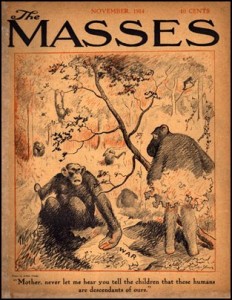While Prof. Blum wisely brings up the absence of medical advances in the survey, I’m worried about another absence that is connected to but not defined by technology and industry: the intellect.
Does intellectual history make an appearance in the survey? Should it?

Today I gave my favorite lecture, which wins this honor in part because I love the material and in part because I think I connect with the students in a way that I normally haven’t yet.
The subject is the decline of the Victorian ethos as the dominant form in American culture and life. I crib enormously from Henry F. May’s classic book The End of American Innocence: A Study in the First Years of Our Own Time. I read excerpts from The Masses and from T.S. Eliot’s “The Love Song of J. Alfred Prufrock.” And I get giddy. I love this stuff. This is a massive cultural transformation away from the universal belief in progress and the moral certainties of the Victorians (and their facial hair) and toward the cynicism and groping for a broader, more humanly awareness of the carnal and artistic urges that drive humankind. It’s more comfortably terrain.
I use this transformation as a preparation to “the twenties,” and then I get caught: is it still fair to say these are the first years of our time? Does the post-World War II period fit better? Post-1991? Post-9/11?
At any rate, I ask my students if they’ve ever heard of William Dean Howells, who was widely considered the best American writer of the turn of the century. Today none of them had. (They had, of course, heard of Fitzgerald, which proved my point perfectly–of the foreignness of the Progressive Era, if not of its ideas). Still, I wondered if we should teach more broadly in our surveys, to include literature, culture, and the intellect. Religion might fit in with that too.




As you and Prof. Blum have pointed out previously, to add something means leaving something else out. I like the idea that no two survey classes look the same, that each class reflects the interests of the instructor and (ideally) the students. This said, to what extent, I wonder, should teachers be transparent about the choices they are making, openly discussing what they are leaving out and why?
As to answer your question regarding William Dean Howells, I have never heard of this man in my life. As you suggested, of course I have heard of Fitzgerald and a few others such as Upton Sinclair and Mark Twain, both cynical and satirical. While broad can be a good way to go, if gone too broad can have no true structure or purpose. I do feel including literature, culture, and intellect, even religion, to be an important aspect in surveys because they too play a vital role in history by affecting society. Who knows how America would be if the staunch Victorian code of ethics had not been broken in the 20’s.
Good point about Howells and intellectual history. It seems to have gone a similar way as cultural history – that everything is rendered culture and thus cannot be understood separately. So Howells fails to get mentioned, as does Dewey in my classes, even though they not only widely known but had important historical impacts.
Joshua, great point. We have to leave out something if we put new stuff in. Perhaps that’s what is so wonderful about teaching history. And yes, I’m pretty open about what I’m leaving out, although I don’t know if I should be. I once had a professor say, on the day she handed out her end-of-semester evaluations, the tactics she employed while teaching, and sure enough, all the evaluations commented on her employment of social history as a vehicle to illuminate political and economic changes–words they’d never used before.
And Philip, I’d love to ponder the final question…what if we all still were Victorians! jolly good, no?